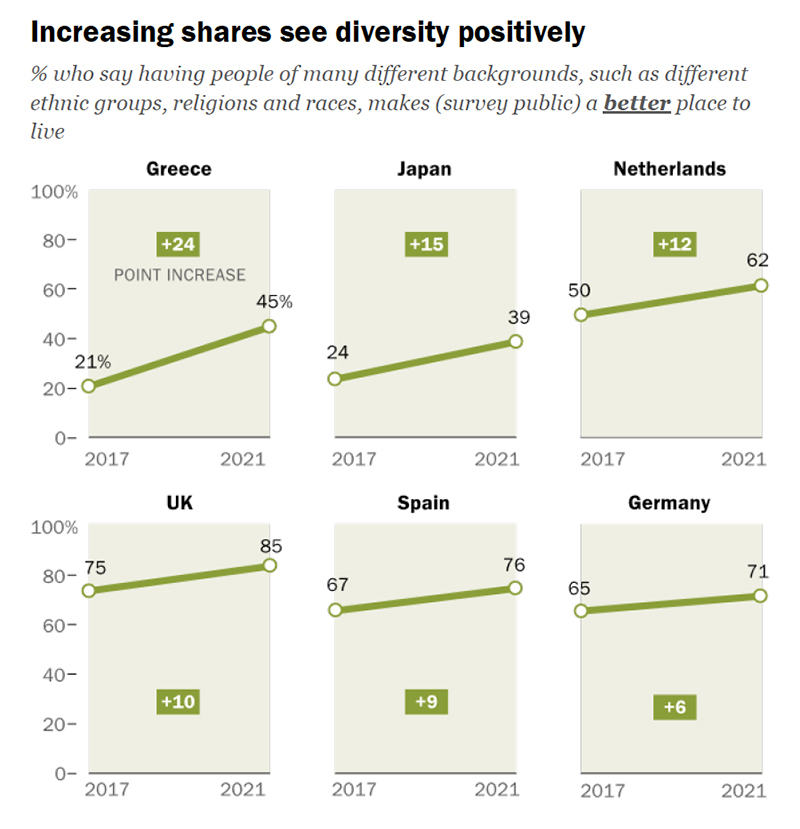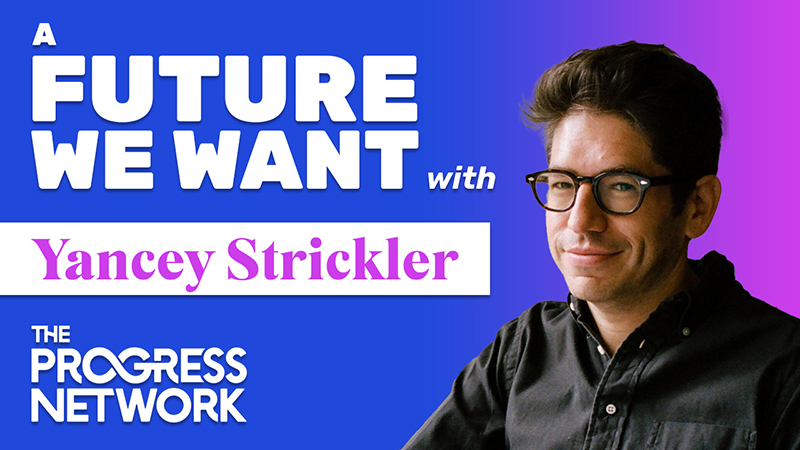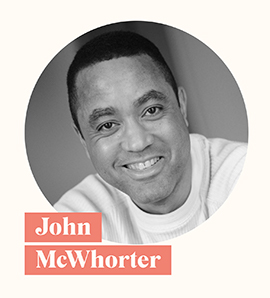Volcanoes are erupting in The Philippines, but on-fire Australia received some welcome rain. The Iran war cries have been called off and The Donald’s military powers are about to be hamstrung by the Senate. Meanwhile, his impeachment trial is starting, and we’re all on Twitter for a front-row seat.
What Could Go Right? A pluralistic utopia
Plus, vaccinating away breast cancer, hauling plastic out of our oceans, and what success at the UN’s climate change conference would look like.
This is our weekly newsletter, What Could Go Right? Sign up here to receive it in your inbox every Thursday at 6am ET. You can read past issues here.
Pluralism’s day in the sun
Maybe we can actually all hold hands and sing “Kumbaya.” In a far cry from what many expect from humanity, in the 17 advanced economies recently surveyed by the Pew Research Center, wide majorities now describe where they live “as benefiting from people of different ethnic groups, religions, and races.” In countries like New Zealand, Canada, the United Kingdom, and yes, the United States, at least 80% viewed diversity positively. In Singapore, apparent world diversity champion, 92% agreed that diversity “makes for a better place to live.”

Japan and Greece were the only two countries surveyed to not hit 60%. But even Greece has changed dramatically since 2017, when the poll was last conducted. The percentage of people who view diversity positively has doubled since then, when 62% of Greeks said diversity made the country a worse place to live. The Pew report also states that younger generations are more open to diversity than older ones, a point so banal that it is taken for granted these days. Imagine the handwringing if it were the opposite, though.
(Speaking of diversity, soon the US will be putting its money where its mouth is. Maya Angelou is about to make her debut on the quarter, the first woman ever to do so.)
A spate of climate commitments
Sunday marks the start of the 26th meeting of the annual climate negotiations hosted by the United Nations (UN Climate Change Conference of the Parties, or COP26 for short). We all know what is at stake.
Nature’s Jeff Tollefson has a balanced and easily digestible explainer here of the history of the conference, participating countries’ current climate policies and where they are leading us, and what success would look like coming out of COP26. “. . . if all 131 countries that have announced or discussed net-zero pledges were to follow through,” he writes, “the projected global temperature increase would be limited to around 2°C above pre-industrial temperatures. That is still short of the Paris 1.5°C goal, but a marked improvement compared with the future scientists were predicting a decade ago.”
One note about that Paris goal. Breakthrough Institute’s Alex Trembath and Ted Nordhaus, writing in Persuasion yesterday about how to make real progress on climate change, pointed out something that few may have realized: the goalposts have moved. The agreement made in Paris was for 1.5–2°C of warming, a fact often elided by news coverage that now favors 1.5°C of warming as the standard to be met. (Tollefson mentions this fact but then subs in the 1.5°C goal as the article continues.)
The meeting has already led to a spate of new climate commitments, including ones from coal-heavy nations like Australia and China as well as from industries like cement. While there’s no telling if such commitments will actually be followed, “the fact that policy-makers today are prepared to make ambitious climate commitments reflects growing confidence in their ability to meet them,” write Trembath and Nordhaus.
We’ll see soon if COP26 will be heralded as a success or will wither on the vine. Long-term, let us be suffused with the energy of the words of economist Johannes Emmerling, which close the Nature piece. “It’s certainly doable,” he says about the shift to clean energy, “and I would say it’s also inevitable.”
A small collection of other environmental progress
There’s the Cabbage Patch Kids. Then there’s the Great Pacific Garbage Patch, an expanse of ocean between Hawaii and California where 1.8 trillion pieces of plastic now live (including some plastic Cabbage Patch Kid heads, probably). Earlier this month, after almost ten years of trying, the nonprofit The Ocean Cleanup deployed a device, nicknamed Jenny, to clean up the plastic, successfully hauling out nearly 20,000 pounds of it. While Jenny is no cure-all—it doesn’t reach plastics below the waters’ surface, for one—its potential for significant improvement has now been proven. The organization’s founder, 27-year-old Dutchman Boyan Slat, “estimated that the team would need about 10 Jennys to clean up 50% of the Great Pacific Garbage Patch in five years.” We’re watching to see if this will scale up to a worldwide cleanup project.
Over in the Atlantic, several governments have agreed to designate a large swath of ocean off the coast of Ireland as a marine protected area, a move that will protect 5 million seabirds from pollution, being caught in fishing nets, and other threats.
Perhaps inspired by Norway’s electric vehicle success, American rental car company Hertz, recently bailed out of bankruptcy, announced their purchase of 100,000 electronic vehicles from Tesla, along with the promise to install thousands of charging stations globally. If you live in a major American or European city, you can rent a Tesla Model 3 by next month. Meanwhile, Paris is trying to forget cars entirely. The city is investing €250 million to become as bicycle-friendly as possible, introducing safer paths, new routes that cross the city and lead into the suburbs, and anti-theft measures. The city of love plans to be the city of cycling by 2026.
Before we go
The life of berry-picking and rabbit-killing has been romanticized enough times that Holden Karnofsky, cofounder of GiveWell, dug into the data to see: was life really better in hunter-gatherer times? (Spoiler: if you are living right now, no, it was not.)
Continuing our unofficial “congratulations, you’ve been vaccinated” series, Rwanda has deployed an impressive rollout of the Covid-19 vaccine doses they’ve been able to obtain. They may also soon be host to Moderna’s first mRNA vaccine plant in Africa.
Last but not least, cute memes—they really do help.
Below in the links section, the FDA backs a Covid vaccine for kids, Barbados says farewell to the Queen, Luxembourg relaxes its cannabis rules, and more.
And a new addition: Every week, we curate from a frighteningly long list of “progressy” stories in the news. But if you’re a progress masochist and want everything—and we mean everything—from the past week, we’ve included our long, long, long list below. (You might want to bring something to eat.) Like it? Let us know, and we’ll keep it in the newsletter.
While breast cancer remains the deadliest cancer that women experience worldwide, cases have been consistently on the decline for decades. Experts credit the hundreds of thousands of lives saved to early detection, improved treatment options, and the discontinuation of hormone replacement therapy. There’s still a lot of work to be done. But there’s a lot to be hopeful about, too. From artificial intelligence solutions to mRNA, read more about how effective treatments for breast cancer are progressing in our latest Progress in Five Minutes: Marching Toward a Breast Cancer Cure.
Progress, Please
(Found good news? Tweet at us @progressntwrk or email.)
Other good stuff in the news
United States:
- Americans want racial diversity more than ever before | Reason
- A future for people with disabilities in outer space is taking flight | The New York Times
- The FDA endorsed the Pfizer-BioNTech vaccine for children 5 to 11 | The New York Times
- Wooden knives that are sharper than steel ones could help cut energy use and plastic cutlery waste | New Scientist
- The FDA wants to let you buy hearing aids without a prescription | NPR
- Private citizens will be allowed to sponsor Afghan refugees | Axios
- California erased $534 million in justice-related debt for low-income residents | The Crime Report
- AMC, the world’s largest movie theater chain, is adding onscreen captions at 240 US locations | NPR
- Worker co-ops are helping drivers keep their profits | The Progressive Magazine
- A new breast cancer vaccine trial has launched at a Cleveland clinic | Today
International:
- A Dutch pension giant will divest $17.5 billion of investments in fossil fuel producers by 2023 | Reuters
- Barbados elected its first president as it prepares to drop Queen Elizabeth as its head of state | The Guardian
- A few idealistic Canadians are trying to replant the world’s forests with drones | The Washington Post
- British Columbia is introducing rebates for electric vehicle chargers | CBC
- Luxembourg became the first country in Europe to legalize growing and using cannabis | The Guardian
- We could see planes fueled by captured CO2 in 2022 | Freethink
- A group in the Philippines is turning plastic waste into building materials | Reuters
- Camel antibodies could be the key ingredient in a universal snakebite antivenom (obviously) | The Telegraph
TPN Member originals ![]()
- Democrats should have focused on the spending, not a massive tax-and-spend bill | Zachary Karabell
- Can Big Government still rein in Big Tech or has it already lost control? (with Atlantic CEO Nicholas Thompson) | Ian Bremmer
- Anti-rent wars, then and now | Alissa Quart
- We need an energy transition strategy | Fareed Zakaria
So you’re a progress masochist, eh? You can browse our long list of links here.
This Week on the Podcast

We all want a more generous world, but how do we design the future we want? In our Season 1 finale, Yancey Strickler, cofounder of Kickstarter and founder of The Bento Society, talks with us about rethinking our self-interests and imagining and creating a better tomorrow.
Upcoming Events
- What Are the Economics of Household Labour? | Diane Coyle | November 19
- FountainHead RI: Fireside Chat | Hubert Joly | December 8
New Member Alert

John McWhorter is a renowned linguist and bestselling author. He teaches linguistics, philosophy, and music history at Columbia University, writes a biweekly column at The New York Times, and is a contributing editor at The Atlantic. He has authored over 20 books, including most recently Woke Racism: How a New Religion Has Betrayed Black America and the New York Times bestseller Nine Nasty Words: English in the Gutter: Then, Now, and Forever.
Read John’s take on our need for a common language in discussing race.
Until Next Time
Remember, we all started somewhere. Happy Halloween!


